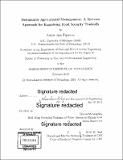Sustainable agricultural management : a systems approach for examining food security tradeoffs
Author(s)
Jain Figueroa, Anjuli.
Download1102638593-MIT.pdf (18.50Mb)
Other Contributors
Massachusetts Institute of Technology. Department of Civil and Environmental Engineering.
Advisor
Dennis McLaughlin.
Terms of use
Metadata
Show full item recordAbstract
Estimates suggest that the world needs a 50% increase in food production to meet the demands of the 2050 global population (Tilman et. al. 2011). Cropland expansion is unlikely to be sufficient, and yield improvements that require more inputs may lead to more environmental damage. This work focuses on reallocating limited land and water resources to optimize cropping patterns. By combining optimization methods, surrogate modeling, global data sources, data assimilation, and hydrologic modeling, we identify opportunities for increasing food-crop production and cash-crop revenue, while maintaining sustainability constraints that limit cropland expansion and prevent groundwater depletion. We apply the framework in India's Krishna river basin and find that reallocating resources to meet or exceed current production can lead to 96% gain in net revenue as resources over an estimated current baseline. Resources in this case are moved to high-yielding cash crops. Imposing a self-sufficient southern diet which depends on rice reduces the gains to 77% while imposing a self-sufficient national diet with more emphasis on wheat eliminates all net revenue gains to the region. The approach described in this thesis, highlights the trade-offs between food production, cost and environmental impacts in achieving specified food-security objectives. This research contributes to the field in two ways: 1) it provides a novel method for combining remotely sensed data, surrogate models and optimization to understand agricultural trade-offs, and 2) it furthers the discussion on food and water security and sustainable resource management by demonstrating that resource reallocation with sustainability constraints provides revenue gains in certain situations.
Description
Thesis: Ph. D., Massachusetts Institute of Technology, Department of Civil and Environmental Engineering, 2019 Cataloged from PDF version of thesis. Includes bibliographical references (pages 118-125).
Date issued
2019Department
Massachusetts Institute of Technology. Department of Civil and Environmental EngineeringPublisher
Massachusetts Institute of Technology
Keywords
Civil and Environmental Engineering.